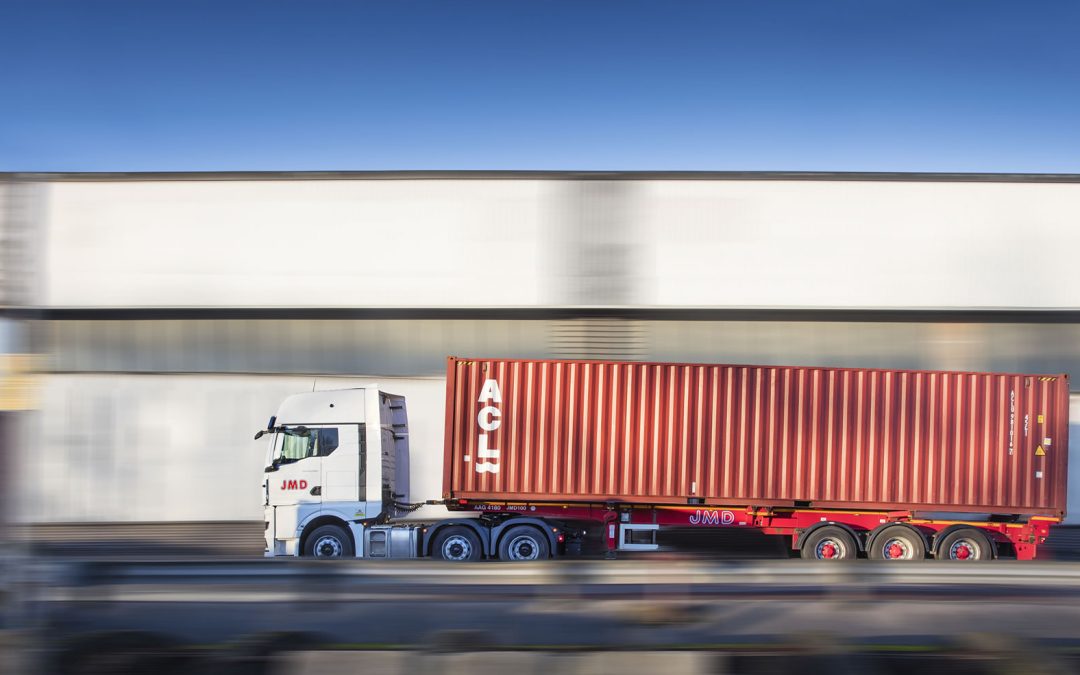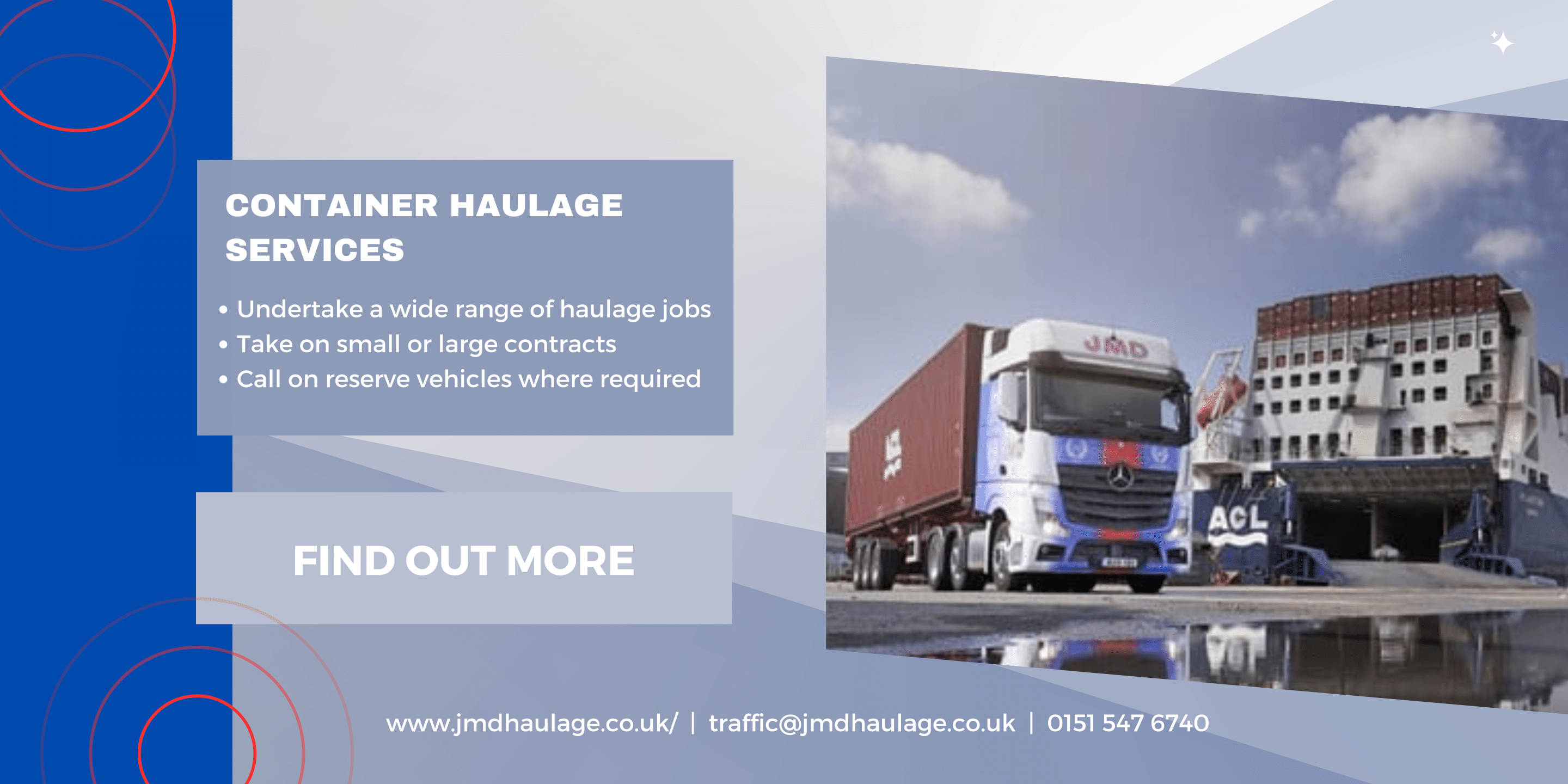Container haulage in the supply chain is a crucial component when planning your global container logistics strategy from the UK to the global playing field. Effectively, it is central to the efficient movement of goods across extensive distances. Originating in the 1950s and revolutionised in the late 1980s, this system streamlined international trade by integrating cheaper shipping costs with advanced telecommunications and computing technologies. Today, container haulage supports the seamless transfer of containers between ships, trucks, and trains and enhances operational efficiency through sophisticated tracking and telemetric systems. Faced with modern challenges such as port congestion and container shortages, the industry continues to evolve, employing innovative solutions to maintain fluidity in the supply chain and uphold economic stability worldwide.
Understanding Container Haulage in the UK
Container transport involves transporting large steel containers via road, rail, and sea, which is crucial for global trade. Standardised at 20 by 40 feet sizes, these containers enable efficient stacking and handling, significantly reducing shipping costs and times. The containers can be packed at the point of origin and seamlessly moved between different transport systems before being unloaded at their final destination. Technology plays a key role in enhancing security and operational efficiency. This logistical backbone supports the swift and safe delivery of goods, underpinning modern supply chains.
Challenges and Solutions in Container Transport
Container haulage faces significant challenges, including port congestion and shortages of containers, which disrupt global logistics and supply. These issues were exacerbated by the COVID-19 pandemic, highlighting the need for regulatory and technological solutions. In response, businesses are increasingly investing in technology to enhance efficiency. The growing emphasis on greener transport solutions and increased global demands have brought additional challenges to the haulage industry. Legislative efforts are underway to prioritise empty containers for essential industries to alleviate bottlenecks. By adopting innovative solutions, the container haulage industry strives to maintain robust and responsive supply chains amid evolving global demands.
Key Factors Influencing Supply Chain Efficiency in Logistics Strategy
Transit times are paramount; reducing these can reduce costs and streamline operations. Reliability in delivery schedules ensures consistency and trust in supply chain dynamics. Global events, such as war, have a knock-on effect across the supply chains, and to mitigate these, haulage companies need to be increasingly flexible and reactive to issues as they arise. Strategic infrastructure development, including ports, minimises transportation legs and associated costs, enhancing overall logistical supply agility and effectiveness.
The Role of Container Haulage in Supply Chain Management
Container haulage is integral to the supply chain, acting as the linchpin that connects manufacturing, distribution, and consumption across global markets. This system facilitates the efficient movement of goods from factories to ports and ports to markets, ensuring that products reach their destinations on time and within budget. Its role includes integrating logistics solutions that enhance the flow of goods through customs, storage, and final delivery. By optimising these elements, container haulage remains critical in maintaining a robust global trade system.
Cost-Effectiveness of Strategic Goods Transportation
Container transport significantly enhances cost-effectiveness within the supply chain by optimising the transportation of large volumes of goods. Standardised container sizes facilitate the easy stacking and handling of goods, which maximises space on ships, trains, and trucks, thereby reducing shipping costs per unit. Economies of scale achieved through containerisation allow businesses to transport products globally at reduced rates. Additionally, advanced routing and scheduling software minimises fuel consumption and idle times, lowering costs. These efficiencies reduce operational expenses and contribute to more competitive consumer pricing, making container haulage a cornerstone of global trade.
Sustainability Benefits of Hauling Containers Mindfully
Container transport solutions offers significant sustainability benefits that contribute to reducing the environmental impact of global logistics. The standardisation of container sizes promotes the efficient use of space on transport vehicles, leading to fewer trips and reduced fuel consumption. Additionally, the ability to stack containers optimally minimises the number of journeys required, lowering emissions. Modern fleets often use eco-friendly trucks that comply with stringent emissions standards, such as EURO 6, enhancing air quality. Furthermore, advancements in telematics allow for better route management and idle reduction, conserving fuel and decreasing the carbon footprint associated with transportation. These practices demonstrate the role of container haulage in promoting sustainable supply chain management.
JMD Haulage Provides Professional and Reliable Container Haulage
In conclusion, container haulage is indispensable to the efficiency and sustainability of global supply chains. It ensures the streamlined transportation of goods across vast distances and incorporates innovative technologies and practices that enhance operational efficiency and environmental responsibility. If you are looking for a professional and reliable container haulage service, then the team at JMD Haulage are here to help. We are conveniently situated near the busy Liverpool docks, so are ideally placed to provide shipment services as part of your international logistics. Contact us to discuss your haulage requirements on 0151 547 6740


